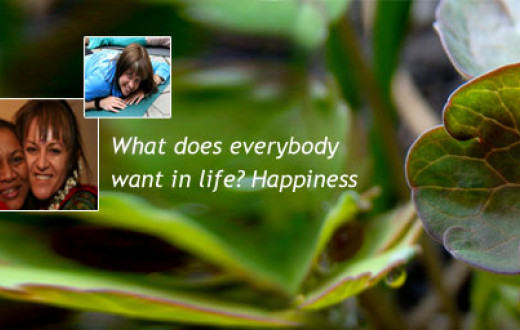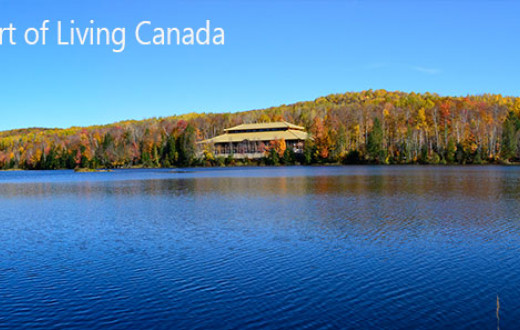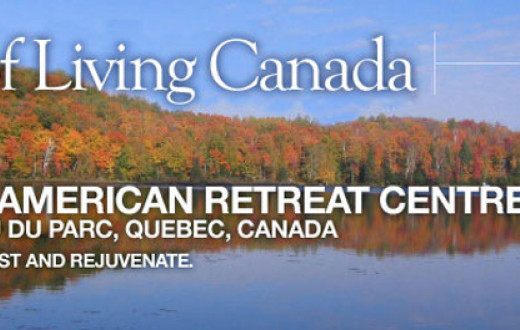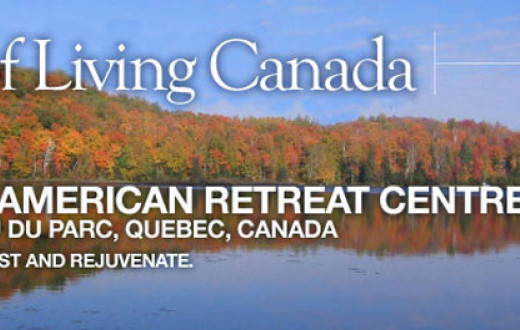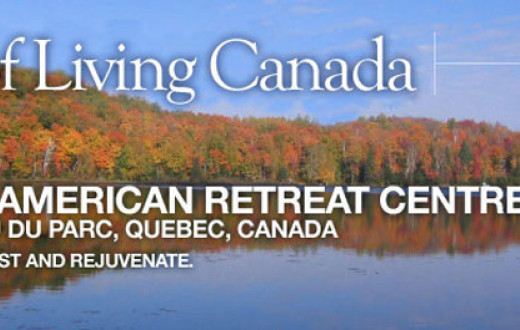Haarlem, Holland

Now tell me, how do you want to spend this evening? What do you want to discuss this evening?
(Audience: Talk about healing; Let us do meditation; Tell us about Ayurveda; Speak on crisis.)
See how the word crisis is bringing laughter and smiles on your faces; this is something very unique, isn’t it?! Usually when people talk about crisis they are crying, but here it is different and this is what The Art of Living is – Turning every crisis to one’s advantage. Taking every crisis as a challenge, as an opportunity is what we need to promote in the world. Don’t you think so?
Do you know, in Chinese language, there is only one word for both opportunity and crisis! If you say crisis, it also means opportunity.
Then what else would you like to discuss?
(Audience: Freedom; Love; How to make decisions; Chaos; How to educate children internationally; Football)
Now tell me, what if I know nothing about any of these topics. I have no idea about football. In India football is not very popular, what is popular is Cricket. Even that I am not familiar with.
So I know nothing about any of these topics.
(Audience: Never mind, it is just good to be here!)
Do you know, we convey more through our presence than through our words; have you noticed this? Our presence conveys a lot. Words are essential, but more than the words is our presence.
I usually quote an example – When you get off an airplane, the air hostesses say, ‘Have a nice day’, but they don’t mean it. It is just coming from the lips. Their mind is working elsewhere. But when the same words come from someone very close to you, from your mother, grandmother, uncle or aunt, it carries some vibrations, some feeling. Have you noticed that?
Love is the essence of life, the goal of life and the beginning of life as well. If there is no love, nobody can survive. When you see from beyond the material perspective, you see that there is a spiritual force which through one person or another brings you this beautiful vibration we call love and care.
As a child, we had this dimension within us – of feelings. Anything that we said or did was very authentic. It was right from the heart. The heart and mind were united. But as we grew older, somewhere, somehow, what happened, we don’t know, but there was a delink between these two and we say things that we don’t mean.
Sometimes people say, ‘Oh, thank you so much!’ Especially in America you can see this. You give someone a glass of water and they say, ‘Oh, thank you so much!’
What is there to thank someone ‘so much’ for giving a glass of water? You are not dying out of thirst in a desert in Saudi Arabia, where if someone gives you water, you say, ‘Thank you so much! You saved my life’, that is not the case. Isn’t it so?
I am not saying that you shouldn’t say ‘Thank you’. I am asking you to put your attention where there is a delink between your words and feelings. That is where the lack of authenticity happens. When we are not authentic in our interaction, life becomes so dull, dry and boring.
What do you want in life? Imagine that you have all the comforts, a nice bed to sleep, good food to eat, but no love, no feeling of belongingness, no one to care for you. No one to care how you live or what happens to you. Would you like to live on this planet?
Life is worth nothing if there is no love, if there is no sense of belongingness. This is the characteristic of human life, or any life for that matter. Even dogs, cats, cows and horses have that feeling. If you have a horse at home, and if you are not there for a month, the horse expresses its love when you come back. Doesn’t it?
To be human is to be connected to our feelings.
That doesn’t mean that you have to be a ‘Blue Star’, as we call it in The Art of Living. A blue star is one who is too wiggly wiggly, too much into emotions and no brains. That is no good either. We need a balance between the emotions and the intellect, a balance between personal and social life.
There are those who are concerned only about themselves. There are others who don’t think about themselves at all. They work like machines and get drowned into it. They don’t even look at what the purpose of life is and what they want from life.
The Art of Living is a balance between these two – personal life and social life. You have to take care of yourself, your mind, your body, your feelings, and you have to take care of the society too. Take responsibility for the society, and at the same time do not ignore your personal growth or self-development.
Neither at home nor at school does someone teach us how to care for the vibrational aspect, the feelings aspect of ourselves, and how to keep our emotions pure, clear, soft, gentle and happy. Nobody teaches us how to be happy. We take it for granted that it is our nature. No doubt it is our nature, but somewhere we lost this. Isn’t it so? And I tell you, it has nothing to do with the stock markets. If you go to Bhutan, Bangladesh, the countries that are very poor, you will see that the people are very happy.
Recently, in the United Nations (UN), the Prime Minister of Bhutan held a seminar called The GDH (Gross Domestic Happiness) which was on how to bring about happiness. Today, everyone is talking about this. And this is something that we have been talking about for the last thirty years. I am so glad that the leaders of the world, finally, after thirty long years or even longer, have started paying attention to human happiness.
Fifty years ago, the governments were not concerned about the health of people. Later on, they started caring for the health of the society. Then they added mental health. After this, they added spiritual health. The World Health Organization (WHO) added spiritual health ten years ago. Now, the governments all over the world are talking about Gross Domestic Happiness. My purpose of being here is to create a wave of happiness in Holland.
Wherever I go, people say, ‘Guruji, please stay here. We are all happy when we are together.’
I say, ‘That is not an excuse to be not happy when I am not there.’ I know, I come and create a wave of happiness, and it is your responsibility to carry on the waves and spread it across. People who have done The Art of Living course find such a transformation. We need to spend a little time for ourselves and meditate and then engage ourselves in social work.
I would like every one of you here to take the lead and become the torchbearer. First, take the resolution that my purpose in life is to create happiness in people. Let me contribute in whatever little manner I can. You can contribute your time, resources, ability, or in any other manner that you can think. Come up with creative ideas and see what we can do to make this society happier.
If you have some problem or some negativity, there is no point in talking about it to everybody. Talking about your frustration is not going to help you; it is not going to go away. If you have trouble or difficulty, bear it and it will pass.
My vision is to see the world free from violence. A violence-free society, disease-free body, confusion-free mind, inhibition-free intellect, trauma-free memory and a sorrow-free soul is the birth right of every individual. There is so much inhibition in the minds of people. We need to clear the inhibitions.
30% of Europe is suffering from depression, and suicide rates are increasing day by day. Shouldn’t we all do something about it? That is why I say that we should combine the most modern technology with some ancient wisdom as well. The people in the ancient days knew a lot of things. We need to combine both; some things from the past and some things from the present generation. Together, we can make the world a better place to live in.
Technology has made the world shrink into a village. It is the humanness and spirituality that can make it into a family. Our vision is a One World Family. We are part of one family. The moment you think that we are all part of one family, see how the feeling in you rises up. Authenticity comes up within you. You become natural. You feel at home with everybody. You are not afraid, ‘Oh, what will that person think about me?’ ‘How will that person judge me?’ All these concerns will drop. There is nothing to hide. You don’t feel that you have to protect yourself or you have to hide something from others, because you know they are your family.
When we say that we need protection, it means that there is fear. Fear is because there is no sense of belongingness.
The Prime Minister of Iraq invited me. When I went there, they gave me twelve vehicles for my security. This was around four to five years ago. The war was just over. There were two tankers, and to cover a distance that would normally take half an hour, it took 2 hours. The hotel where I was staying in was surrounded by security guards. It was the green zone.
There were three zones - the green zone, the yellow zone and the red zone. I told the ministers that I have not come here to be in a security cordon. I want to go and meet the people. They said, ‘Oh, it is a red zone; you can never go there. You are an important person and a guest from India. We cannot let you go there.’
I said, ‘I have my own security. Please let me go.’ I insisted on going there. I wanted to communicate with those who were not willing to talk. The government was very nervous, but they could not refuse a request from a guest.
So, I went there and met with people. There was so much anger in the people in the beginning. I met the tribal leaders. The Shia council hosted a reception for me. They were so grateful. There were tears in their eyes. They said, ‘Guruji, this is your second home. Please come back to us. Don’t desert us.’ They don’t speak my language, nor do they belong to my religion, but there was such a sense of care, love and belongingness. Then, the Prime Minister of Iraq sent fifty youths to India to be trained as ambassadors of peace.
These fifty youths landed in Bangalore. They don’t speak a word of English. We had a translator for them. They would keep awake very late at night and wouldn’t follow any rules. They would fight with each other.
At the ashram, it is very peaceful. The people there had never seen such a scene. It was very tough. They also eat a lot of meat, and in the ashram, we give only vegetarian and healthy food. So, the first day was difficult. The second day was even more difficult. The third day was unbearable. They wanted to run away. I spoke to them and somehow they stayed back. The fourth day, the shift happened.
Today, I am glad to tell you that these youths went back and one of them is helping the Prime Minister in his secretariat. These people are full of smiles. The Prime Minister asked me, ‘What have you done to them? They are smiling all the time and are so full of enthusiasm, in spite of stressful situations.’
These leaders went back as ambassadors of peace and started teaching thousands of people how to be calm, how to connect with themselves and with others, and how to be happy.
Of course this is just a drop in the ocean; I can’t say everything has transformed. Even today there are bomb blasts happening in Iraq. It has not completely transformed the whole of Iraq but it has brought some very significant change in the same youths who otherwise didn’t know how to be peaceful.
So, I feel that the world needs this knowledge – how to relate to oneself and how to relate to others. What do you think?
Love is the essence of life, the goal of life and the beginning of life as well. Life began with love, life is sustained by love. If there is no love, nobody can survive. See when you were a baby, you were not independent. Every a baby is dependant, but you did not feel dependant because there is the mother’s love which makes you part of herself. And when you grow up, then you seek love in life. You seek it in relationships, you seek in your children, you seek from your elders; everywhere. And when you become old, then also you can’t be independent, somebody has to care for you, and there is enough love.
When you see from beyond the material perspective, you see that there is a spiritual force; there is an energy which brings this to everyone. And that same energy, whatever you call that, through one person or another, it brings you this beautiful vibration we call love and care. We are made up of it. We are made up of the substance of what we are seeking in life. Meditation is relaxing or reposing in that by which we have all come up. It is getting back to our source; that is it! And I tell you, this source from which the whole creation has sprung from is unfathomable, is eternal, is so beautiful, and is enormous. I cannot even describe what it is.
I am asking you to put your attention where there is a delink between your words and feelings. That is where lack of authenticity happens. When we are not authentic in our interaction, life becomes so dull, dry and boring.
We shouldn’t talk too much about love because it is inexpressible, actually!
One of my observation, which I find very interesting is, in the East they don’t express love so much. They feel love but they don’t express it. They are shy to tell someone, ‘I love you so much’. They are very shy and they usually do not say these words.
I know my mother loved me so much and I loved her, but never once did she tell me, ‘Oh, I love you so much’, and nor did I tell her. We never said these words at all. And normally in India we don’t say these words, ‘I love you so much’; we never say that. Even between husband and wife, we don’t verbalize the feeling.
At the same time in America, it is just the opposite. Whether one sits or stands they keep saying, ‘Oh, I love you so much dear’, ‘Oh my honey, I love you my honey.’
From the morning cup of tea till the time you go to bed you go on repeating it a million times.
I feel somewhere there should be a middle ground, a middle path.
See, in India, in the villages, people may be in love but they never ever say it, they never express their love. Love should be like a seed which is sown in the ground, but if you sow it too deep, it will never sprout. And if you keep it on the surface of the mud, then also it won’t sprout, it won’t take roots.
It should be neither America nor the Far East, but somewhere in between which would be a good thing to do. So you do express, but you don’t express it so much that you initially call your spouse, ‘Honey, honey, honey’, and then you become diabetic.
You start with, ‘I can’t live without you’, and then later you say, ‘I can’t stand you.’
This happens so often. So I feel that we should take a middle path, express a little but not too much.
At the same time, demand destroys love. Never demand. Usually spouses ask, ‘Do you really love me?’ They keep asking this to each other.
‘You don’t love me these days. Do you really love me?’ When you start asking these questions, even if they have some love for you, that also goes away.
‘Oh my God I have to prove to this person that I really love them.’ It is such a burden for someone to prove their feelings for you because feelings are inexpressible. However you express, still it remains unexpressed.
Already a person is finding it so difficult to express their feeling and on top of it you are demanding for it to be expressed, and then they start to think, ‘Oh my God, this is a big headache. ’
That is how many relationships break and become a disaster a little later.
I will give you a beautiful technique to follow – If you find that someone’s love for you is going down, you should ask them, ‘Why do you love me so much? I really don’t deserve it, you love me too much!’ Then they feel more elevated and much happier.
If you are in a space of contentment, people would love to be with you. If you are in a space of frustration or lack, people will try to move away from you. This is my observation, what do you think?
So, did I address all your topics? Anything left out? Anything not attended to?
(Audience: Silence)
So we covered everything, right!
Don’t think you are not intelligent. You have enough intelligence.
You need a little push and that is why I keep moving around. You need a support group. Like many people know that alcoholism is bad but many people fall into it, and so they have this AA group, where people give them that little support that is needed.
So, we have Sudarshan Kriya groups all over. Why this group is there is because alone if you feel lazy to do the exercises, you can do it with a group, and it helps.
Same with exercise; why are there gyms? At home everyone can exercise, why go to a gym? This is because at home you feel so lazy to do it, but when you go to a gym there are several people you can exercise with. And if there is a trainer, it becomes easier because the trainer encourages you and that helps you to move into it.
There is an ancient proverb in Sanskrit that says, ‘When you have to bear the cross you do it alone but when you want to learn and practice, do it with others’ – Ekas Tapasvi Dwir Adhyayi.
If you have some problem or some negativity, there is no point in talking about it to Tom, Dick and Harry. Spreading your problems around results in them only labeling you, ‘Oh, this person is horrible, and negative all the time’, they don’t feel uplifted. So talking about your negativity and frustration is not going to help you, it is not going to go away. Usually people talk about the problem to everybody else except where it could be solved.
If you have an illness, you should only talk to the doctor; he can do something about it. There is no point describing your illness over the phone for half an hour to your friend, because they can’t do anything for you. Only the phone company benefits from this.
I tell you, if people in the world stop talking about their illness to their friends, the income of phone companies will reduce by at least 40%. It is not necessary to talk about your problem to everybody. If you have trouble or difficulty, bear it and it will pass. And when you want to practice something, like piano or violin, it is always good to have somebody, right!
So whether it is music, or studies or gym or yoga and meditation, it is good to do it in groups.
This morning we had about 900 people doing pranayama and meditation. I asked them, ‘How many centers do we have?’ And they said, ‘We have five centers in Holland.’
Then I told them that is not enough. We need to have centers everywhere. People should gather and start doing the breathing practices and yoga exercises and that would uplift their energy. Don’t you agree with me? How many of you would be interested in creating more of such places where people can come and become happier? Centers of happiness! (Many raise their hands)
You all should create centers of happiness where once in a week people come together, sing together, eat together, and have a feeling of togetherness and uplift each other.
So you all be leaders to create happiness in society.
I want to really bring waves of happiness in Holland. We should reach out to every village and see to that nobody commits suicide anywhere in Holland in the next one year. The success of Art of Living is measured by the dip in the sale of Prozac. We should aim at it that Prozac is out of the pharmacies of Holland because there is no one to buy them. Keep this as our vision – no one needs to go and buy Prozac. Shall we do this?
So we should move in this direction. Our aim is to bring down the sale of Prozac.





